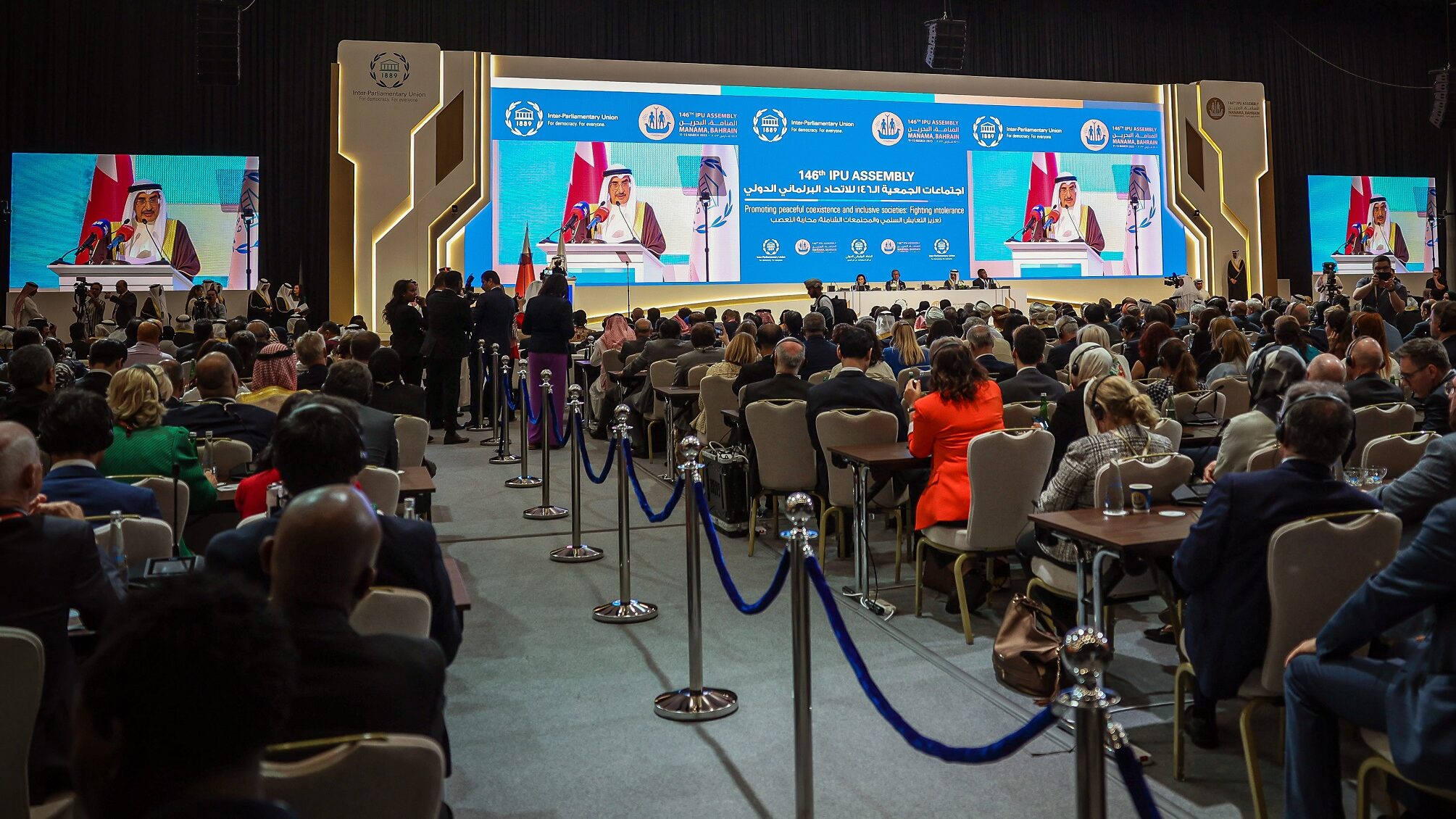Parliamentarians From 143 Countries Meet in Manama, Agree To Combat Intolerance
Lawmakers at the Inter-Parliamentary Union's 146th Assembly pledge to promote peaceful coexistence
Representatives of the world’s parliaments agreed to enact more legislation criminalizing hate speech and violence at the Inter-Parliamentary Union (IPU) Assembly in Manama, Bahrain last week.
The 146th general assembly of the organization brought together around 1,700 representatives from 143 countries’ parliaments. The Manama Declaration produced at the close of the assembly, subtitled “Promoting peaceful coexistence and inclusive societies: Fighting intolerance,” lists 24 recommendations, including many initiatives related to combating terrorism, improving the status of women, achieving global security and stability, and establishing a central emergency fund of the IPU.
The assembly also called for the prevention and punishment of genocides, the achievement of gender equality by 2030, and the establishment of a disaster relief coordinator position within the IPU. The assembly also established a Central Emergency Response Fund administered by the Office for the Coordination of Humanitarian Affairs, meant to fund humanitarian response efforts around the world.
“The Inter-Parliamentary Union is considered like the United Nations, but it differs regarding its decisions in that they are voluntary and nonbinding,” Rafza Kafakji, head of the Turkish IPU delegation said during a press conference. “There is an importance to parliamentary diplomacy in the world and its role in discussing challenges and finding solutions that reflect the voices of the people who chose their representatives.”
The IPU’s recommendations referred to the specific needs of low- and middle-income countries, which host 74% of the world’s refugees and other people in need of international protection, with the least developed countries providing asylum for 22% of the global refugee population. The UN estimates that nearly 120 million people will be stateless or forcibly displaced by the end of 2023.
Besides the official sessions, hundreds of smaller meetings were held between representatives of the world’s parliaments, the most prominent of which was between representatives of the Bahraini and Iranian parliaments.
Bahrain has not had diplomatic ties with Iran since 2016, following an Iranian arson attack on the Saudi Embassy in Iran.
Representatives of the participating parliaments also sought to highlight the positions of their countries on the various issues that were discussed.
The Iranian delegation attempted to convey that Iran is seeking peace in the region and is open to dialogue to resolve various outstanding issues, such as the country’s nuclear program, ballistic missiles, and support for what the international community considers terrorist groups.
In the opening speech, Bahraini Deputy Prime Minister Khalid bin Abdullah Al Khalifa reiterated the King of Bahrain Hamad bin Isa Al Khalifa’s calls for “consensus on decisions that enhance the spirit of tolerance and peaceful coexistence and deepen the international partnership in achieving security and peace and ending wars and crises by peaceful means.”
He expressed Bahrain’s support for achieving sustainable development goals through fair solutions to environmental issues, securing international navigation and energy supplies, cooperating to ensure water and food security, facilitating trade exchange, and investing in renewable energy projects, digital transformation, and future sciences.
The deputy prime minister also called on the international community “to strengthen legislative and technical cooperation in approving an international agreement to criminalize religious, sectarian and racist hate speech in all its forms, and to prevent the abuse of media and digital freedoms and platforms to disrespect religions or incite fanaticism, extremism, and terrorism, and to work collectively to spread a culture of peace, understanding, and acceptance of the other.”
We hope to reopen the Bahraini Embassy in Tehran and the Iranian Embassy in Manama soon
Relations between Bahrain and Iran seem to be improving. “We hope to reopen the Bahraini Embassy in Tehran and the Iranian Embassy in Manama soon,” Mojtaba Rezakhah, head of the Iranian IPU delegation, told The Media Line. “We have a lot in common. We sat with the speaker of the Bahraini Parliament and agreed on the need to improve relations between the two countries.”
Rezakhah acknowledged the outstanding issues facing the two countries but said that he hoped they would be resolved soon.
“It is likely that we will visit Bahrain soon, and we have invited the speaker of the Bahraini Parliament to visit Iran,” he said. “We are open to Bahrain and all possible options are offered to build strong relations, and we are ready to discuss various issues. I believe that Gulf-Iranian relations are improving now, and we aspire to improve relations between Bahrain and Iran.”
The Inter-Parliamentary Union must adopt the call of the king of Bahrain to endorse an international agreement to criminalize religious, sectarian, and racist hate speech in all its forms, and to prevent the abuse of freedoms and media and digital platforms to [express] contempt [for] religions or incite fanaticism, extremism, and terrorism
Parliamentary representatives from around the world affirmed the importance of the topics discussed at the assembly.
“The Inter-Parliamentary Union must adopt the call of the king of Bahrain to endorse an international agreement to criminalize religious, sectarian, and racist hate speech in all its forms, and to prevent the abuse of freedoms and media and digital platforms to [express] contempt [for] religions or incite fanaticism, extremism, and terrorism,” Speaker of the Yemeni House of Representatives Sultan al-Barakani told The Media Line.
Ricardo Baptista Leite, a Portuguese member of parliament and founder of the Parliamentarians Network for Global Health, told The Media Line that the attendees had “developed several ideas and solutions suitable for various challenges” relating especially to global health problems.
This transformation is not easy, especially since we see many conflicts, many crises, and many economic obstacles
Andrei Savinykh, chair of the Permanent Committee for Foreign Affairs in the Belarusian Parliament and former ambassador to Iraq, told The Media Line that IPU gatherings are becoming more important as the world transforms “from a unipolar world to a multipolar world.”
“This transformation is not easy,” he said, “especially since we see many conflicts, many crises, and many economic obstacles.”


